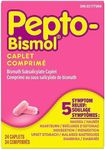Buying Guide for the Best Anti Diarrhea Medication
Choosing the right anti-diarrhea medication can make a big difference in how quickly and comfortably you recover from digestive issues. It's important to understand that not all medications work the same way, and your choice should be guided by your symptoms, underlying health conditions, and the cause of your diarrhea. Always read labels carefully and consider consulting a healthcare professional if you have ongoing symptoms, other health problems, or are taking other medications.Active IngredientThe active ingredient is the main component that helps control diarrhea. Common ones include loperamide and bismuth subsalicylate. Loperamide works by slowing down the movement of the gut, which helps absorb more water and makes stools less watery. Bismuth subsalicylate, on the other hand, helps reduce inflammation and can also relieve nausea and upset stomach. When choosing, think about your symptoms: if you just want to slow diarrhea, loperamide may be enough; if you also have stomach upset or nausea, bismuth subsalicylate might be better. Always check for allergies or interactions with other medications.
Form (Tablet, Liquid, Chewable)Anti-diarrhea medications come in different forms such as tablets, liquids, and chewables. Tablets are easy to carry and dose, liquids are good for those who have trouble swallowing pills or need to adjust the dose, and chewables are convenient for children or people who dislike swallowing pills. Choose the form that fits your lifestyle and comfort, and consider who will be taking the medication.
Onset of ActionOnset of action refers to how quickly the medication starts to work. Some medications can begin to relieve symptoms within an hour, while others may take longer. If you need fast relief, look for products that mention quick action on the label. If your symptoms are mild or you can wait, a slower-acting medication may be sufficient.
Duration of EffectThis is how long the medication continues to work after you take it. Some anti-diarrhea medications provide relief for several hours, while others may need to be taken more frequently. If you need long-lasting relief, such as during travel or work, look for a medication with a longer duration. If you only need short-term relief, a shorter-acting option may be fine.
Age SuitabilityNot all anti-diarrhea medications are safe for all ages. Some are only for adults, while others have versions for children. Always check the age recommendations on the packaging. If you are buying for a child or elderly person, make sure the product is appropriate for their age group.
Additional BenefitsSome anti-diarrhea medications offer extra benefits, such as relief from gas, cramping, or nausea. If you have multiple symptoms, look for a product that addresses more than just diarrhea. However, if you only have diarrhea, a simple formula may be all you need.
Contraindications and WarningsCertain health conditions or situations mean you should avoid some anti-diarrhea medications. For example, people with certain infections, chronic bowel diseases, or allergies may need to avoid specific ingredients. Always read the warnings and consult a healthcare provider if you have any doubts, especially if you have ongoing health issues or are pregnant or breastfeeding.















